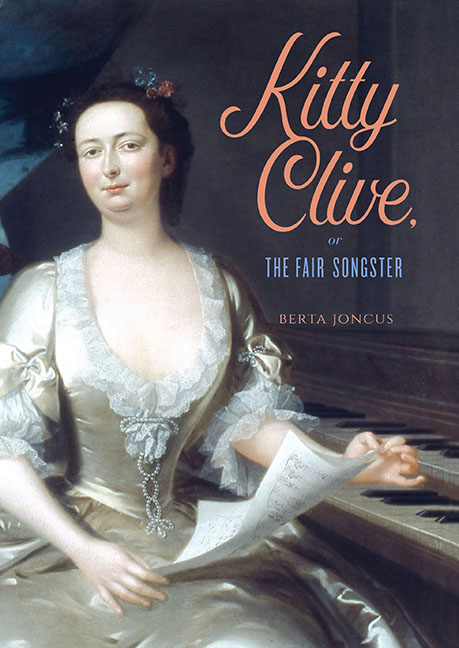Book contents
- Frontmatter
- Dedication
- Contents
- Illustrations
- Preface
- Conventions of Transcription
- 1 The Siren Song: Kitty Clive in the Playhouse
- 2 ‘The Lovely Virgin tun'd her Voice’: Henry Carey and the Production of a Native Songster
- 3 ‘Charm'd with the sprightly Innocence of Nell’: The Metamorphosis of Miss Raftor
- 4 ‘HINT writes, and RAFTOR acts in Drury-lane’: Clive, Fielding, and Theophilus Cibber
- 5 ‘The pious Daughter, and the faithful Wife’: Fielding, Miller, and Clive, 1733–35
- 6 ‘A Likeness where none was to be found’: Contested Images of Clive, 1734–37
- 7 The Patriot Soprano: British Worthies at Drury Lane
- 8 Handel and the Sweet Bird of Drury Lane, 1740–43
- 9 The Case of Mrs. Clive
- 10 Of Scuffles and Rivalries: The Demise of ‘Kitty Cuckoe’
- 11 From Miss Lucy to Mrs. Riot: Voice and Caricature
- 12 Clive on Clive: The Rehearsal: Or, Bays in Petticoats
- 13 Conclusion: The Fair Songster
- Appendix 1 Catherine Clive's Roles 1728–69
- Appendix 2 Lines in Catherine Clive's Repertory 1728–69
- Appendix 3 The Case of Mrs. CLIVE (1744)
- Select Bibliography
- Index
12 - Clive on Clive: The Rehearsal: Or, Bays in Petticoats
Published online by Cambridge University Press: 20 September 2019
- Frontmatter
- Dedication
- Contents
- Illustrations
- Preface
- Conventions of Transcription
- 1 The Siren Song: Kitty Clive in the Playhouse
- 2 ‘The Lovely Virgin tun'd her Voice’: Henry Carey and the Production of a Native Songster
- 3 ‘Charm'd with the sprightly Innocence of Nell’: The Metamorphosis of Miss Raftor
- 4 ‘HINT writes, and RAFTOR acts in Drury-lane’: Clive, Fielding, and Theophilus Cibber
- 5 ‘The pious Daughter, and the faithful Wife’: Fielding, Miller, and Clive, 1733–35
- 6 ‘A Likeness where none was to be found’: Contested Images of Clive, 1734–37
- 7 The Patriot Soprano: British Worthies at Drury Lane
- 8 Handel and the Sweet Bird of Drury Lane, 1740–43
- 9 The Case of Mrs. Clive
- 10 Of Scuffles and Rivalries: The Demise of ‘Kitty Cuckoe’
- 11 From Miss Lucy to Mrs. Riot: Voice and Caricature
- 12 Clive on Clive: The Rehearsal: Or, Bays in Petticoats
- 13 Conclusion: The Fair Songster
- Appendix 1 Catherine Clive's Roles 1728–69
- Appendix 2 Lines in Catherine Clive's Repertory 1728–69
- Appendix 3 The Case of Mrs. CLIVE (1744)
- Select Bibliography
- Index
Summary
Clive plays Hazard – her farewell song – a last engagement with Susannah Cibber – Henry Woodward complains – on being a female Scribbler – Clive claims her parts
The Rehearsal: Or, Bays in Petticoats of 1750 was Clive's boldest stage experiment, the first stage work she ever wrote – and, in retrospect, a farewell to her career in serious song. My account of Clive's career ends here, with her musical adieu to the Fair Songster.
Like all ‘rehearsal’ burlesques, Clive's derived from the Duke of Buckingham's Rehearsal (1671), led by the poet-critic Bayes. Clive wrote The Rehearsal for her benefit of 15 March 1750, recorded by Drury Lane prompter Richard Cross as ‘A new farce partly singing, part speakg. Went off well’. After her Rehearsal, Clive wrote other benefit farces, channelling into words the ear and stage instinct she had first developed through song. This chapter focuses on the ways that Clive, in the first of four versions of her Rehearsal in particular, did this. In the third (1753) version of this work, Clive used burlesque to take a final shot at Susannah Cibber.
Buckingham's Rehearsal of 1671 was effectively a Green Room ‘peep’ whose vantage point he controlled. He mixed correction with malice: seemingly empirical, the writer burlesques a genre to correct its excesses, while also baiting recognizable celebrities. Others, most famously Henry Fielding, followed Buckingham. By contrast, Clive twisted Buckingham's model to make herself the celebrity under attack. Already the subtitle Bays in Petticoats makes Clive the joke, alluding as it does to the fiasco of the 1743 benefit at which she wore breeches to lead Buckingham's Rehearsal: it is the fatty Clive's admission that she had overstepped herself. Yet the subtitle signals also Clive's defiance. Determined to play the critic on her terms, she reverses the travesty that had made her an object of derision at her benefit. By conceding her faults, Clive grants herself licence to criticize others, her male peers in particular.
Buckingham based his Rehearsal on Molière's L'Impromptu de Versailles (1663). That Clive embraced Buckingham's farce reminds us how much Molière's dizzy, commedia-inspired action suited her. Writing her own vehicle, she follows Molière's ploy of pitting one character's grasp of what's going on against another's, and draws wit from these conflicting viewpoints. Into this she inserts herself, in propria persona.
- Type
- Chapter
- Information
- Kitty Clive, or the Fair Songster , pp. 378 - 408Publisher: Boydell & BrewerPrint publication year: 2019



